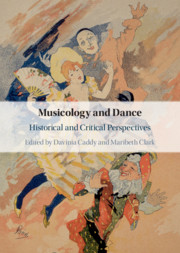Introduction
Published online by Cambridge University Press: 09 September 2020
Summary
The introduction describes the ten chapters of the volume, and how they provide models for a historically grounded musicology that recognizes relationships between gestures and words, music and dance, human bodies and social acts over time. It describes how these chapters address many of the challenges that arise in the study of European music and dance together: the ephemerality of performance, the fuzzy boundaries between theatrical and social dance, the legacies and inequalities associated with colonialism and imperialism, the complexity of the sources (choreographic notation and its absence, musical scores and their absences, film, treatises and reviews, to name just a few). It also grapples with the divides among related areas, disciplines and fields, including performance studies, theatre and dance history, comparative literature, film studies, philosophy, cognitive psychology, music theory, history, anthropology and sociology as well as musicology.
Keywords
- Type
- Chapter
- Information
- Musicology and DanceHistorical and Critical Perspectives, pp. 1 - 16Publisher: Cambridge University PressPrint publication year: 2020

